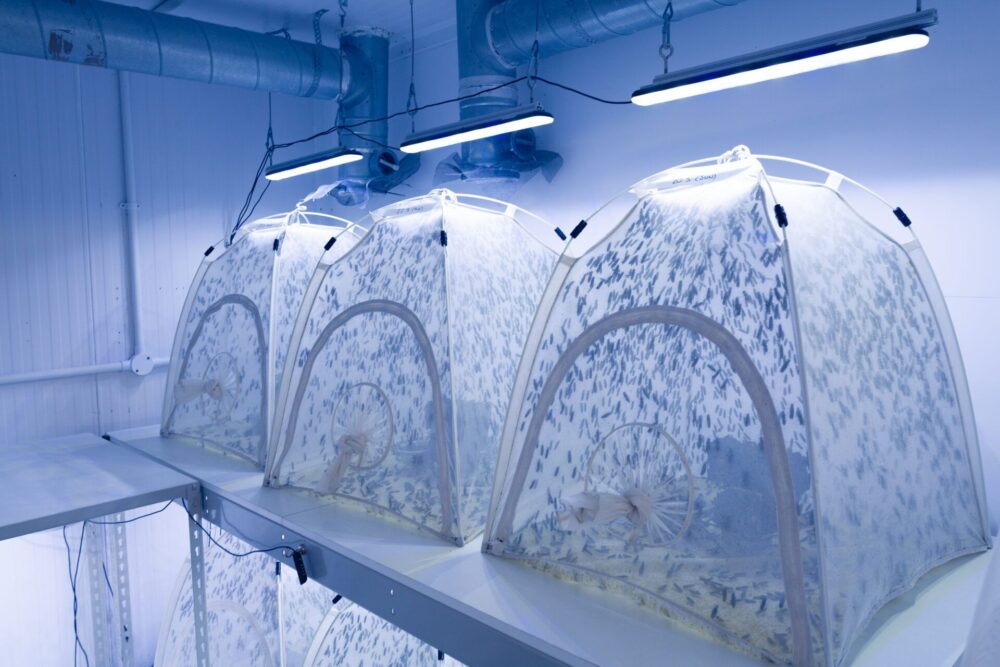Entocycle, a UK startup that provides technologies and services for the insect farming industry, has secured $5 million in a Series A round from a pool of climate-positive institutional investors and athletes as angel investors.
- Leading the round was Climentum Capital, a climate-focused seed and Series A investor with offices in Berlin, Copenhagen and Stockholm.
- Other investors included Lowercarbon Capital, which invests in companies that reduce carbon emissions, Paris-based and sport star-studded investment firm Teampact Ventures, and global investment group ACE & Company.
- Angel investors include renowned athletes Antoine Dupont, Nikola Karabatic, James Haskell, and Antoine Brizard.
- The funding will go towards Entocyle’s commercial roll-out of its products and services as well as team expansion.
Why it matters
There is a lot of research pointing to the significant growth of the insect protein market, albeit with varied projections. This is unsurprising given the challenges surrounding food waste — a typical feed stream for farmed insects — and the increasing demand for sustainable protein for both animal and human consumption. One popular insect, the black soldier fly, has an industry projection of $3.96 billion by 2023.
New insect farms are cropping up across the globe each year, many of them covered on the pages of AFN such as here and here. But it’s been a long road for even the best-funded of these farms, with challenges around making the economics work alongside tech progress and real-world operations, much like we are seeing in the vertical farming industry today.
Entocycle is not a farm; instead, it is a technology company aimed to help insect farmers — black solider flies specifically — be more efficient by providing them with a suite of precision counting, sorting, and automation equipment.
According to Entocycle, it’s hard for humans to manually manage billions of insects through different phases of their lifecycle yet accuracy is key for a successful insect farm. For example, accurate head counts impact how much feed is used, which impacts the economics. Feed amounts also impact quality standards and the nutritional requirements of off-takers and buyers, which in turn impacts the price farms can charge.
“We’ve taken the best in class from food production and we’ve taken the best in class from traditional and animal husbandry, which is that you need to know exactly how many animals you have in your system. Because if you don’t, you cannot produce a quality product, you cannot then mass scale it,” Keiran Olivares Whitaker, founder & CEO at Entocycle tells AFN.
Who are the customers?
Entocycle’s clientele is made up of two main groups. One comprises insect farming companies and waste upcycling companies that want to increase their efficiencies. The other group is new entrants to the industry, who have shown particular interest in Entocycle’s farm building, design, and project management services.
Entocycle offerings include Entosight Neo, its flagship product. This comprises hardware and software designed to perform functions such as weighing and counting larvae. According to the startup, inaccuracies in the two processes arise due to human error when done manually. When done correctly, the correct amount of feed can be designated; insect mortality rates are reduced; growth is boosted overall.
The startup also offers climate-controlled fly rooms that it claims optimize egg production.
“You know how many insects you’ve got and you know how much food you could feed them. We’ve shown that you can get up to 25% bigger insects by just dosing the insects correctly because if you overfeed the insects, what you’re left with is a few very fat insects and essentially lots of costs. If you underfeed the insects, what you end up with are lots of very small insects and that’s not good as a final product to the customer,” Whitaker says.
Entocycle is now gearing to commercialize and supply its products. Its focus markets will include Europe and Eastern and Southern Africa. Japan, Singapore and Korea will be Asian targets because of their allegedly strong regulations around food security or using food waste. Entocycle is also eyeing the Gulf Region because of its massive farming projects and waste management priorities.
The startup also wants to serve farmers who deal with other insect species at some point. For now, the focus has been on black soldier fly due to its industrial prevalence and the startup’s understanding of the insect’s biological process.
“What we are fantastic at doing is counting, sorting, and automating the delivery of very small moving things. So for us to apply that to other sectors, we see that as a next step,” Whitaker says.
What they’re saying
“We want to help regenerate this planet by making food local again, because hyperlocalism is going to come and insects are going to play a key role in not just a global industry, but also in localized food security. That’s why I want to see us helping this planet by offering our technology and services and actually delivering what we see is the fastest way to grow this industry,” Whitaker tells AFN.
“We finally have a solution to decentralize and localize production, solve the global feed shortage and accelerate the transition towards low-carbon alternative proteins, all at once”, says Yoann Berno, general partner at Climentum Capital. “We’re proud to lead this round, as there’s no better insect breeding technology on the market. Entocycle has developed a full stack of breeding solutions for small farmers and full-scale waste managers, which would take years and millions of dollars to replicate.”





